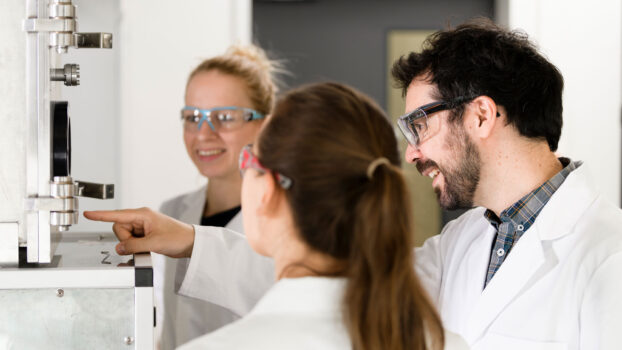Life Science Engineering (LSE)
Life Science Engineering (LSE) (M.Sc.)

The Master’s degree program in Biotechnology deals with the application of state-of-the-art technologies for biological systems and processes. The focus is on the development of innovative solutions for the fields of medicine, environmental and food technology. As a graduate of this program, you will have a broad knowledge of biochemistry, biotechnology, biophysics and process engineering. The interdisciplinary orientation of the degree program enables you to work in a wide range of professional fields and face the challenges of the future.
- Degree
- Master of Science
- Duration of studies in semester
- 4
- Start of degree program
- Summer semester, Winter semester
- Study location
- Erlangen
- Number of students
- 50-150
- Subject group
- Engineering sciences
- Special ways to study
- International degree program, Part-time degree program
- Teaching language
- German and English
- Admission Requirements
- Qualification assessment
- Keywords
- Biotechnology, Bioengineering, Medical Engineering
What is the degree program about?
Biotechnology is an engineering degree program with a focus of industrial and medical biotechnology, as well as bioproduct processing. It combines scientific fundamentals with technical applications. The resulting applications serve the transition from a petroleum-based industry to a bioeconomy and the protection of human health and the environment.
The Master’s degree program lasts four semesters and builds on the knowledge and skills learnt in the Bachelor’s degree program. Students of the degree program learn advanced scientific methods and gain in-depth knowledge, especially in the fields of biological process engineering and (medical) biotechnology.
-
The master’s degree program includes specialization modules, compulsory elective and elective modules, a three-week project development course, a twelve-week industrial internship and the six-month Master’s thesis.
In the Master’s degree program, students have the opportunity to acquire in-depth expertise in at least three core areas of biotechnology and process engineering, for example:
- Bioreaction and bioprocess engineering
- Medical biotechnology
- Bioseparation
- Mechanical process engineering
- Metabolic engineering
Individual orientation also allows students to choose seven compulsory elective modules from a board catalog of current, research-oriented topics. Examples of compulsory elective modules are: Immunobiotechnology, Food Biotechnology, Pharmaceutical Technology, Biophysics/Biomechanics, Environmental Bioprocess Enginnering.
2 elective modules (1 from science/engineering and 1 from the FAU module catalog) round out graduates‘ profiles.
-
- Excellent results in national and international rankings
- Over 260 subjects; flexible options and wide range of opportunities for specialization
- Close cooperation with industry and research institutions
- An economically strong region
- Study in the middle of the vibrant and diverse Nuremberg Metropolitan Region
- International students from all over the world: networking during the Master’s program
-
Graduates of the Master’s degree in Biotechnology are qualified to start a doctoral degree or for various professions in fields, for example
- in the biotechnological, pharmaceutical, agrochemical, medical and environmental technology, food technology, paper and pulp industries, textile industry, in waste management companies as well as in water treatment (in each case in the fields of research, development, production, project management, marketing)
- at planning, manufacturing and assembly companies for process engineering processes and plants (technical management, planning, sales)
- at supervisory and licensing authorities (controlling, implementation and review of legal regulations)
- at associations and organizations
- in public or private research institutes (project management, basic research).
-
- Admission requirements (first semester)
- Qualification assessment
- Application deadline winter semester
-
15.07.
- Application deadline summer semester
-
15.01.
- Content-related admission requirements
-
Applicants with a Bachelor’s degree in biotechnology with a grade of 2.5 or better, or with an average grade of 3.0 or better in the modules of at least four core subjects (see the examination regulations) qualify for admission to the Master’s degree program in Biotechnology. Applicants with a degree that is not fully equivalent or/and with a final grade worse than 2.5 can only be admitted to the Master’s degree program if they pass the oral admission examination. The Master’s Admissions Committee decides on the suitability of an applicant for the Master’s degree program.
In addition, proof of proficiency in both German and English at level B2 of the Common European Framework of Reference for Languages must be submitted.
Consecutive degree program /Subject-specific Bachelor’s degree
- Biotechnology (former Life Science Engineering)
Related Bachelor’s degree/admission to Master’s degree program possible with with additional courses:
- Chemical Engineering – Sustainable Chemical Technologies
- Energy Engineering
- Chemical and Bioengineering
Language skills
- German language skills for international applicants
- B 2
- General language skills
-
German and English: B2
Do you need help or more information?
Our Student Advice and Career Service (IBZ) is the central point of contact for all questions about studying and starting a degree programme. Our Student Service Centres and subject advisors support you in planning your studies.